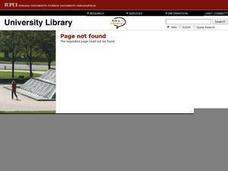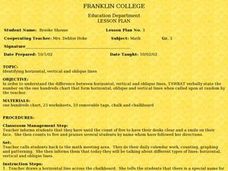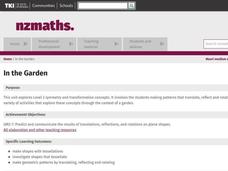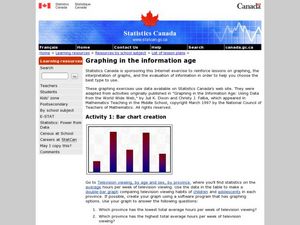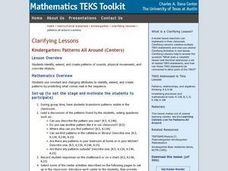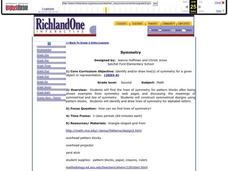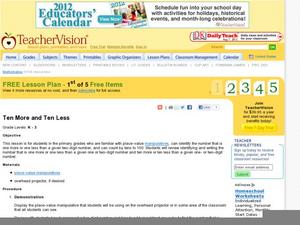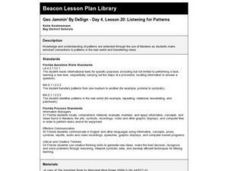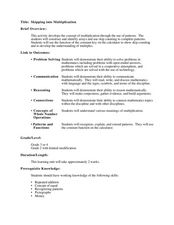Curated OER
Patterns and Functions
Students investigate patterns and functions. In this algebra lesson plan, students examine the repetition of integers and objects. They create formulas for the repetition and identify them as function using equations.
Curated OER
Mathematics in Art?
Fifth graders view prints of M.C. Escher's work. They look at examples of geometric figures and polygons and discuss places they have seen them. Students create their own tessellations. They write a report about the process they used in...
Curated OER
Identifying Horizontal, Vertical and Oblique Lines
Third graders watch the teacher draw a horizontal line across the board. They listen to the definition of horizontal and has a student demonstrate putting their body in a horizontal position. This is repeated with a vertical line. The...
Curated OER
Squares in the Light
Young scholars collect and analyze data using a graph. In this algebra lesson, students explain their findings orally and with a graph. They use their knowledge to solve real life scenarios.
Curated OER
Linear Piecewise Functions
Students explore the concept of piecewise functions. In this piecewise functions lesson, students graph piecewise functions by hand and find the domain and range. Students make tables of values given a piecewise function. Students write...
Curated OER
Slopey Math
Students identify the slope of a line and use it to solve real life problems. In this algebra lesson, students write linear equations in slope intercept form and make a correlation to its relation to the real world. They use the slope an...
Curated OER
In The Garden
Learners examine symmetry and transformation concepts. They create patterns that translate, reflect and rotate. Students participate in a variety of activities that explore transformation concepts through the context of a garden.
Curated OER
Graphing in the Information Age
Students create a variety of graphs based on population data. In this statistics lesson, students use data that can be gathered on-line to make a bar chart, line graph, and circle graph.
Curated OER
Patterns All Around (Centers)
Students identify, extend, and create patterns of sounds, physical movements, and concrete objects. They brainstorm patterns found in the classroom. Students use mathematical attributes to identify patterns and predict what comes next.
Curated OER
Exploring Geometric Patterns and Relationships
Students explore the concept of geometric patterns. They use a review of patterns with numbers for a warm-up activity.Then the teacher does examples with the students attempting to find the pattern.
Curated OER
Symmetry
Second graders find the lines of symmetry in pattern blocks and alphabet letters. In this symmetry activity, 2nd graders discuss what symmetry is, view examples of lines of symmetry and apply what they have learned by finding the line of...
Curated OER
What's the Best Deal?
Students explore number sense by solving consumer math problems. In this pattern identification lesson, students analyze a list of numerical and geometric patterns while predicting the future outcome. Students utilize inference skills to...
Curated OER
Shape Hunt
Students explore two-dimensional and solid shapes. In this shapes and patterns geometry lesson, students work with a partner to create identifiable objects using tangrams. Students describe the attributes of their shape and their partner...
Curated OER
What do two-dimensional tessellations look like? Where in art can they be found?
Students explore the world of art and culture, including the works of M.C. Escher. They identify and create original tessellations. Students use a wealth of interactive multimedia applications. They explore the artistic representations...
Curated OER
Investigation - Can You Guess My Favorite Color?
Second graders explore a bag of mixed pattern blocks. As a class they discuss different attributes of these shapes. In this math lesson, 2nd graders search to find shapes that are similar by placing shapes on top of one another to...
Curated OER
Number Chart and Number Line
First graders research strategies for identifying numbers through 100. In this number recognition lesson, 1st graders make games, create puzzles,and fill in missing numbers to practice number identification.
Curated OER
Why is this lesson constructivist?
Students formulate a definition of tessellations by comparing and contrasting different patterns and shapes of real objects. They discuss the relatioship between shapes and patterns as well as their function in the real world. Students...
Curated OER
Rep Tiles
Third graders use pattern blocks of one shape at a time to try to create a similar shape. They compare the perimeter of the new figure with the perimeter of the original shape and look for a pattern. Students use the pattern to predict...
Curated OER
How Does Your Garden Grow?
Students construct and maintain a school garden. In this gardening lesson, students plan the construction of the garden by writing letters to local businesses asking for supplies and materials; students build the garden using their math...
Curated OER
Ten More and Ten Less
Get learners to analyze two-digit numbers based on place value, and use manipulatives to add and subtract both 1 and 10. A place value chart is available, and you can project it during guided practice. Through visualizing...
Curated OER
Geo Jammin' By Design: Listening for Patterns
Young scholars listen to the teacher read a book and participate with guided questions. They discuss patterns and how they repeat, by looking at quilts. They design their own quilt block to create a class quilt.
Curated OER
Creating Fractals
Students solve problems using fractals. In this geometry lesson, students identify properties of fractals. They find patterns in their surroundings and relate it to the real world and math.
Curated OER
Skipping Into Multiplication
Young mathematicians study the relationship between skip counting and multiplication. They build on skip counting skills and examine arrays while studying multiplication. Resources are provided.
Curated OER
Using Rhythm Instruments to Tell a Story
After watching a video of Peter and the Wolf, and identifying the instruments used to represent each character, class members use rhythm instruments to represent the actions in the song, "What Would I do."

